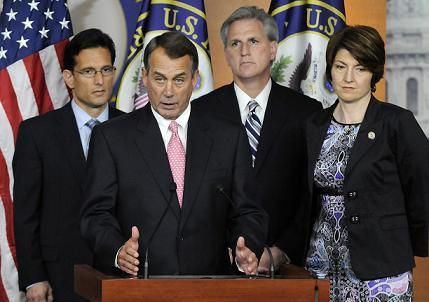Looming Debt Ceiling, Budget Talks Could Help Kill 2013 Immigration Reform

House Republicans are meeting Wednesday to decide on a 2013 immigration reform strategy, but the prospects that an immigration bill will ever make it to President Barack Obama’s desk seems less and less likely. And that’s partly because of two other big issues looming: the debt ceiling and the budget.
Compared to the debt ceiling debacle of the summer of 2011, there is relative composure on Capitol Hill now, since the debt ceiling negotiations that caused a summer showdown two years ago have shifted to a likely fall brawl. Thanks to improvement in revenues and the “extraordinary measures” the Treasury has taken to manage its cash and borrowing, the U.S. will avoid hitting its debt ceiling until after Labor Day. The nonpartisan Congressional Budget Office has projected a deficit reduction that will bring the shortfall down to about $642 billion this year, the least since 2008 and less than half, as a percentage of the economy, what it was in 2009. But the CBO also said those extraordinary measures will likely be exhausted around October or November.
That said, chances are, if the House and Senate haven't gotten immigration bills into conference by the August recess, immigration reform will be pushed to the back burner, in favor of issues that the Republicans who control the House perceive as far more pressing.
Republicans know acting on immigration reform is essential for the party’s long-term survival. But in the shorter term they are likely going to hit Democrats where it could hurt in the 2014 midterms -- the one-year delay of the Obamacare employer mandate.
“Things will get ugly in September, in the fall, and I think it will have a negative impact on immigration reform legislation in the House,” said Steve Bell, senior director for the Economic Policy Project at the Bipartisan Policy Center. “I hate to say that, but I think it will.”
The reason, said Bell, a former staff director of the Senate Budget Committee, is that immigration reform involves money. It took a “border surge” bill costing more than $30 billion, written by two Republican senators and establishing tighter controls, to attract 14 of their colleagues to the broader immigration legislation that passed the Senate 68-32 last month. Aside from a fight about money, Bell thinks there will also be a fight over the legalization process for undocumented immigrants that many conservatives label as “amnesty.”
Bell is not the only one who thinks time isn’t on the side of immigration reform this year. That’s also the sentiment shared by Republican strategist Ron Bonjean of Singer Bonjean Strategies in Washington, who said the debt ceiling will consume a lot of time. For him, the Republicans’ immigration reform strategy is evolving. But there's no need to scramble on that issue yet.
“It becomes harder after Labor Day because we’re dealing with the debt ceiling,” Bonjean said. “Because we’re facing an election year it’s just going to be very, very difficult for Congress to get something to the president’s desk by the end of this year, especially when they have a fiscal crisis on their hands.”
When it comes to solving the nation’s fiscal crisis, the House Republicans have an ambitious wish list of what they should demand in exchange for raising the approximately $16.4 trillion ceiling. And if the next debt ceiling showdown is anything like the past, both Democrats and Republicans are going to want what’s in the best interest for their bases. Republicans are thinking of marrying the debt ceiling with tax reform and cuts to government and entitlement spending. The idea of a grand bargain that was floated earlier is fading, because Democrats will not stand for a huge overhaul of entitlement programs at this time. The question now becomes: Can Rep. Dave Camp, R-Mich., chairman of the House Committee on Ways and Means, advance a tax reform plan through Congress by fall? In exchange for an increase in the debt ceiling, according to the Bipartisan Policy Center’s Bell, that could give Republicans a way to move beyond their threats of shutting down the government. But something will still need to be done about government appropriations and food stamps, which will need funding by Oct. 1.
“This scenario really and truly is being seriously considered, but it has so many moving parts,” Bell added. “It’s sort of like a four-dimensional Rubik’s cube. So why is there loads of calmness? Because nobody has an answer to it yet.”
“I think [House Speaker John Boehner] very much would like a grand bargain, but he doesn’t have anybody to negotiate with,” he said. “Senate Democrats don’t want a grand bargain, the president doesn’t want a grand bargain and so you ask yourself this question, ‘does the president want a resolution, that is a bill, or does he want an issue for 2014?’ That’s kind of always been the question with the president.”
The answer may come from the Republican camp. On immigration reform, GOP House members are unlikely to take any stance that leaves them vulnerable to a tea party challenger from the right -- and will do so until filing dates for potential primary challengers to run have passed.
“As you get closer to that date they get freer and freer,” Bell said. “It’s going to be an uphill battle because all these things are going to take a lot of time on the floor and they’re going to be politically quite hot and it will just depend on whether or not some Republicans, in addition to taking on deficit and debt spending, want to take on immigration also.”
© Copyright IBTimes 2024. All rights reserved.






















